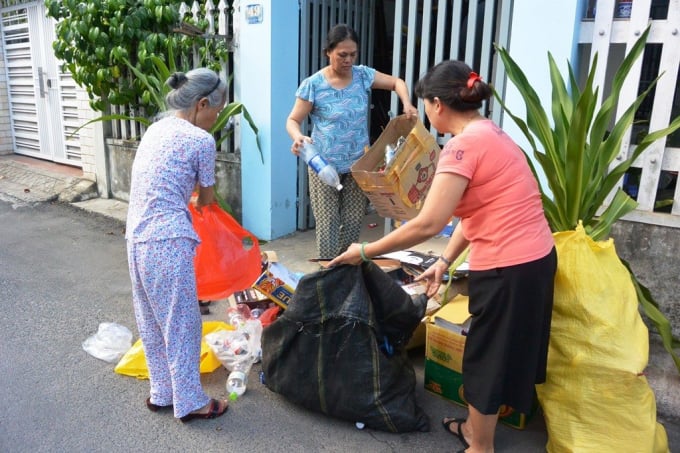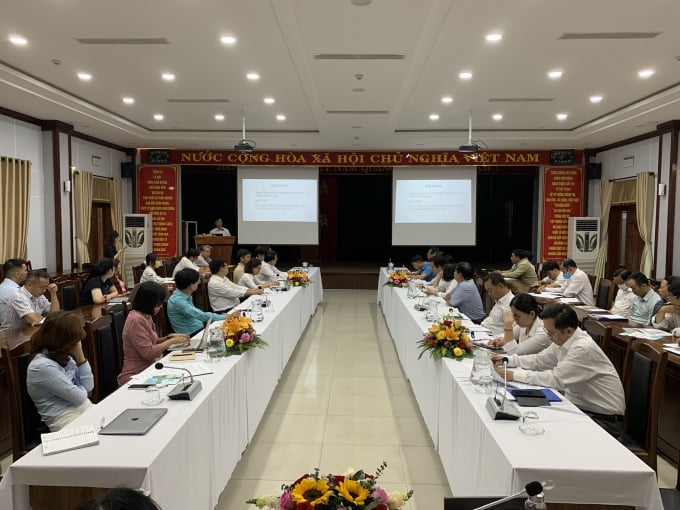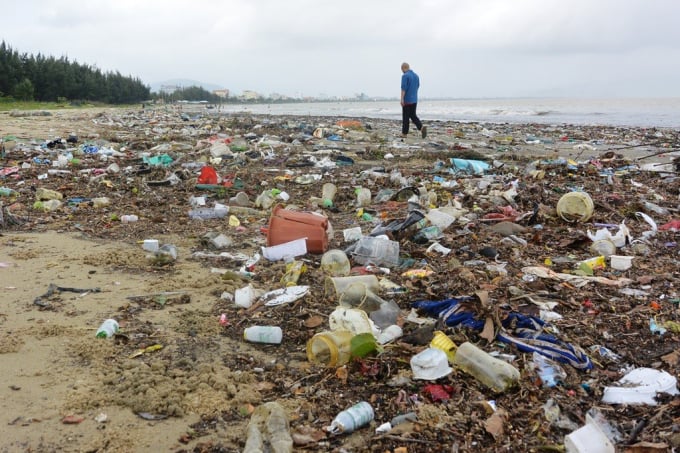May 21, 2025 | 04:33 GMT +7
May 21, 2025 | 04:33 GMT +7
Hotline: 0913.378.918
May 21, 2025 | 04:33 GMT +7
Hotline: 0913.378.918

Da Nang citizens collect and classify waste. Photo: L.K.
The high speed of economic development has placed pressure on Da Nang City, including the problem of plastic waste. According to statistics of the Department of Natural Resources and Environment of Da Nang City, the city generates more than 1,100 tons of waste every day. It is estimated that in the period from 2020 to 2025, the amount of the city's waste will reach more than 1,800 tons/day.
At the current rate, the amount of waste generated will be more than 2,400 tons/day by the period of 2025 – 2030 and more than 3,000 tons/day in the period of 2030 - 2040. Meanwhile, the whole city currently has only Khanh Son landfill that is being overloaded and will be unable to receive and treat city waste in the future.
Located in the central area, adjacent to the sea and many other districts, Thanh Khe District has the highest population density in Da Nang city, leading to a very high amount of waste generated per day (about 190 tons/day). The waste audit results show that plastic bags account for the highest percentage, followed by multi-layer packaging and single-use plastic, of the total amount of waste produced in the district.
From such figures, Thanh Khe District has committed to participate in the program "Plastic Smart Cities" launched by the World Wild Fund for Nature in Vietnam (WWF-Vietnam) to effectively manage plastic waste.
Via its specific and practical activities, the program aims to reduce 30% of plastic waste released into the environment after 2 years of signing a commitment to participate in the program.

A conference on the plan to reduce plastic waste was organized in Thanh Khe District. Photo: L.K.
Le Trung Minh Tan, Head of the Department of Natural Resources and Environment of Thanh Khe District, said that the People's Committee of Thanh Khe District has recently issued an action plan on plastic waste management in the district by 2025, which is part of the collaboration plan with WWF.
According to this plan, the management of plastic waste must be approached through the integrated management method, requiring the cooperation of all relevant organizations, businesses, communities and individuals, in addition to the initiative, flexibility and responsibility of the political management system; the support and cooperation of domestic and international organizations.
All aim at the common goal of reducing the amount of waste released into the oceans from land-based sources and marine activities. Along with that are the measures of raising awareness about harm and changing the behavior of using single-use plastic products or non-biodegradable plastic bags.
Other measures include successfully deploying the waste classification model at source in Thanh Khe district in particular and Da Nang city in general while promoting initiatives or models to reduce the use and generation of plastic waste in particular and all kinds of waste in general.
Thanh Khe District strives to achieve results in two timelines, namely 2022 and 2025. Accordingly, by 2022, the plastic waste loss rate in the area will be reduced by 30% compared to 2020; 100% of state management agencies and units in the district do not use plastic water bottles and straws and the use of banners, stage fonts in meetings, conferences, seminars and events will be minimized.
In addition, the program will also delete at least 3 waste hot spots and ensure that no new waste hot spots are generated; at least 10 schools can organize activities to integrate environmental education programs - plastic waste; 70% of households, schools, businesses, offices and other units in the district classify domestic waste at source...
By 2025, successful pilot activities and models in the period 2021 – 2022 will be institutionalized in writing, district’s specific policies and replicated on a broader scale. The rate of plastic waste loss will be reduced by 50% in Thanh Khe District compared to 2020.

Plastic waste is seen on the beach of Da Nang. Photo: L.K.
Also by 2025, the district strives to have effectively implemented mechanisms to monitor and penalize businesses for improperly littering; ensuring that 100% of households, schools, businesses, offices and other units classify waste at source; at least 30% of drinking water and food businesses commit not to use single-use plastic products in coastal tourist attractions and service areas; at least 50% of fishermen commit not to dispose of fishing gear and plastic waste into the sea.
Le Trung Minh Tan, Head of the Department of Natural Resources and Environment of Thanh Khe District, said that Thanh Khe District also coordinated with WWF to organize a conference to introduce the program "Plastic Smart Cities” program in Da Nang City in March and the district’s plan to reduce plastic waste by 2025 and in 2021.
At this conference, Thanh Khe District People's Committee also introduced practical activities planned specifically for each quarter; in which, focusing on communication - education; collection, classification, treatment and recycling; pollution control and international cooperation. At the same time, Thanh Khe District will also coordinate with WWF to develop long-term plans and strategies for better waste management.
“However, not many activities have been able to be carried out due to the effects of the pandemic. Therefore, in the upcoming time, when the situation has become stabilized, all relevant units will continue to implement the program with the goal of obtaining the highest results", he said.
Translated by Luong Huong

(VAN) Japan's grant aid project contributes to capacity building, promoting organic agricultural production, and fostering sustainable community development in Dong Thap province.

(VAN) For years, the CRISPR-Cas9 genome technology has been reshaping genetic engineering, a precision tool to transform everything from agriculture to medicine.

(VAN) Vietnam aims to become a 'leader' in the region in the capacity and managing effectively soil health and crop nutrition.
![Reducing emissions from rice fields: [Part 1] Farming clean rice together](https://t.ex-cdn.com/nongnghiepmoitruong.vn/608w/files/news/2025/05/05/z6509661417740_a647202949c539012a959e841c03e1d3-nongnghiep-143611.jpg)
(VAN) Growing clean rice helps reduce environmental pollution while increasing income, allowing farmers to feel secure in production and remain committed to their fields for the long term.
/2025/05/19/5136-1-144800_230.jpg)
(VAN) The Nghe An Provincial People's Committee has just approved the list of beneficiaries eligible for revenue from the Emission Reductions Payment Agreement (ERPA) in the North Central region for the year 2025.

(VAN) 14 out of 35 domesticated elephants in Dak Lak province have had their living conditions improved, with 11 of them currently participating in the non-riding elephant tourism model.

(VAN) Muong Nhe Nature Reserve hopes that being upgraded to a national park will lay the foundation for forest protection efforts to be carried out in a systematic, modern, and sustainable manner.